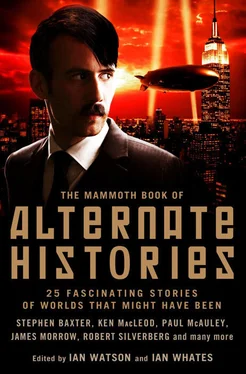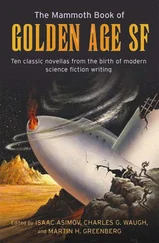9 May 1912
Lat. 27°14’N, Long. 55°21’ W
This morning the Good Lord sent us potable water, gallons of it, splashing into our cisterns like honey from heaven. If we cleave to our usual draconian rationing, we shall not have to take up the Ancient Mariner’s despairing chant — “Water, water everywhere, nor any drop to drink” — for at least two months. Surely we shall encounter more rain by then.
Predictably enough, my directive concerning the steerage meat occasioned a lively conversation aboard the Ada. A dozen first-cabin voyagers were so scandalized that they began questioning my sanity, and for a brief but harrowing interval it looked as if I might have a mutiny on my hands. But in time more rational heads prevailed, as the pragmatic majority apprehended both the utilitarian and the sacramental dimensions of such a menu.
Reverend Bateman, God bless him, volunteered to oversee the rite — the deboning, the roasting, the thanksgiving, the consecration — a procedure in which he was assisted by his Catholic confreres, Father Byles and Father Peruschitz. Not one word was spoken during the consumption phase, but I sensed that everyone was happy not only to have finally received a substantive meal but also to have set a difficult precedent and emerged from the experience spiritually unscathed.
14 May 1912
Lat. 27°41’ N, Long. 54°29’ W
Another wreck, another set of medical supplies, another trove of cooking fuel — plus two more legible newspapers. As it happened, the Philadelphia Bulletin for 22 April and the New York Times for 29 April carried stories about the dozens of religious services held earlier in the month all over America and the United Kingdom honouring the Titanic’’ s noble dead. I explained to our first-cabin and second-cabin passengers that I would allow each man to read about his funeral, but he must take care not to get the pages wet.
Needless to say, our most illustrious voyagers were accorded lavish tributes. The managers of the Waldorf-Astoria, St Regis, and Knickerbocker hotels in Manhattan observed a moment of silence for Colonel John Jacob Astor. (Nothing was said about his scandalously pregnant child bride, the former Madeleine Force.) The rectors of St Paul’s church in Elkins Park, Pennsylvania, commissioned three Tiffany windows in memory of the dearly departed Widener family, George, Eleanor and Harry. Senator Guggenheim of Colorado graced the Congressional Record with a eulogy for his brother, Benjamin, the mining and smelting tycoon. President Taft decreed an official Day of Prayer at the White House for his military adviser, Major Butt. For a full week all the passenger trains running between Philadelphia and New York wore black bunting in honour of John Thayer, Second Vice-President of the Pennsylvania Railroad. During this same interval the flags of all White Star Line steamers departing Southampton flew at half-mast in memory of the company’s president, J. Bruce Ismay, even as the directors of Macy’s Department Store in Herald Square imported a Wurlitzer and arranged for the organist to play each day a different requiem for their late employer, Isidor Straus. The Denver Women’s Club successfully petitioned the City Council to declare a Day of Mourning for Margaret Brown, who’d done so much to improve the lot of uneducated women and destitute children throughout the state.
On the whole, our spectral community took heart in their epitaphs, and I believe I know why. Now that our deaths have been duly marked and lamented, the bereaved back home can begin, however haltingly, to get on with the business of existence. Yes, throughout April the mourning families knew only raw grief, but in recent weeks they have surely entered upon wistful remembrance and the bittersweet rewards of daily life, wisely heeding our Lord’s words from the Gospel of Matthew, “Let the dead bury their dead.”
18 June 1912
Lat. 25°31’N, Long. 53°33’W
To reward our steerage passengers for accepting the Medusa initiative with such élan, I made no move to stop them when, shortly after sunrise, they killed and ate Mr Ismay. I could see their point of view. By all accounts, from the moment we left Cherbourg Ismay had kept pressing the captain for more steam, so that we might arrive in New York on Tuesday night rather than Wednesday morning. Evidently Ismay wanted to set a record, whereby the crossing-time for the maiden voyage of the Titanic would beat that of her sister ship, the Olympic. Also, nobody really liked the man.
I also went along with the strangling and devouring of Mr Murdoch. There was nothing personal or vindictive in my decision. I would have acquiesced even if we didn’t detest each other. Had Murdoch not issued such a boneheaded command at 11.40 p.m. on the night of 14 April, we wouldn’t be in this mess. “Hard a-starboard!” he ordered. So far, so good. If he’d left it at that, we would’ve steamed past the iceberg with several feet to spare. But instead he added, “Full astern.” What the bloody hell was Murdoch trying to do? Back up the ship like a bloody motorcar? All he accomplished was to severely compromise the rudder, and so the colossus slit us like a hot knife cutting lard.
When it came to Mr Andrews, however, I drew the line. Yes, before the Titanic sailed he should have protested the paucity of lifeboats. And, yes, when designing her he should have run the bulkheads clear to the brink, so that in the event of rupture the watertight compartments would not systematically feed one another with ton after ton of brine. But even in his wildest fancies, Mr. Andrews could not have imagined a three-hundred-foot gash in his creation’s hull.
“Let him amongst you who has designed a more unsinkable ship than RMS Titanic cast the first stone,” I told the mob. Slowly, reluctantly, they backed away. Today I have made an eternal friend in Thomas Andrews.
5 December 1912
Lat. 20°16 ‘N, Long. 52°40 ‘W
Looking through my journal, I am chagrined to discover that the entries appear at such erratic intervals. What can I say? Writing does not come easily for me, and I am forever solving problems more pressing than keeping this tub’s log up to date.
Since getting below the Tropic of Cancer, we have endured one episode of becalming after another. Naturally Mr Futrelle supplied me with an appropriate stanza from Coleridge. “Down dropt the breeze, the sails dropt down — ‘twas sad as sad could be, and we did only speak to break silence of the sea.” And yet we are much more than the poet’s painted ship upon a painted ocean. The Ada abides. Life goes on.
In August, young Mrs Astor gave birth to her baby, faithfully attended by Dr Alice Leader, the only female physician on board. (Mother and child are both thriving.) September’s highlights included a spellbinding public recitation by Mr Futrelle of his latest Thinking Machine detective story, which he will commit to paper when we reach dry land. (The plot is so devilishly clever that I dare not reveal any particulars.) Last month our resident theatre company staged a production of The Tempest, directed by Margaret Brown and featuring our fetching movie-serial actress Dorothy Gibson as Miranda. (The shipwreck scene provoked unhappy memories, but otherwise we were enchanted.) And, of course, each dawn brings a plethora of birthdays to celebrate. Mr Futrelle informs me of the counterintuitive fact that, out of any group of twenty-three persons, the chances are better than fifty-fifty that two will share a birthday. I couldn’t follow his logic, but I’m not about to question it.
On the romantic front, I’ve been pleased to observe that our young wireless operator, Harold Bride, has set his cap for a twenty-one-year-old Irish emigrant named Katie Mullen. (Though Mr Bride has not been pleased to observe me observing him.) In June, Mr and Mrs Strauss marked their forty-first wedding anniversary. (Mr Lightoller arranged a candlelit dinner for them above pontoon F.) In July, Mr Guggenheim and his mistress, Mme Léotine Aubert, finally got married, Rabbi Minkoff officiating. (They passed their honeymoon in the gazebo above pontoon D.) Sad to say, last month Mr and Mrs Widener decided to get divorced, despite the protests of Father Byles and Father Montvila. The Wideners insist their decision has nothing to do with the stress of the sinking, and everything to do with their disagreements over women’s suffrage. I personally don’t understand why the gentler sex wishes to sully its sensibility with politics, but if ladies really want the vote, I say give it them.
Читать дальше












